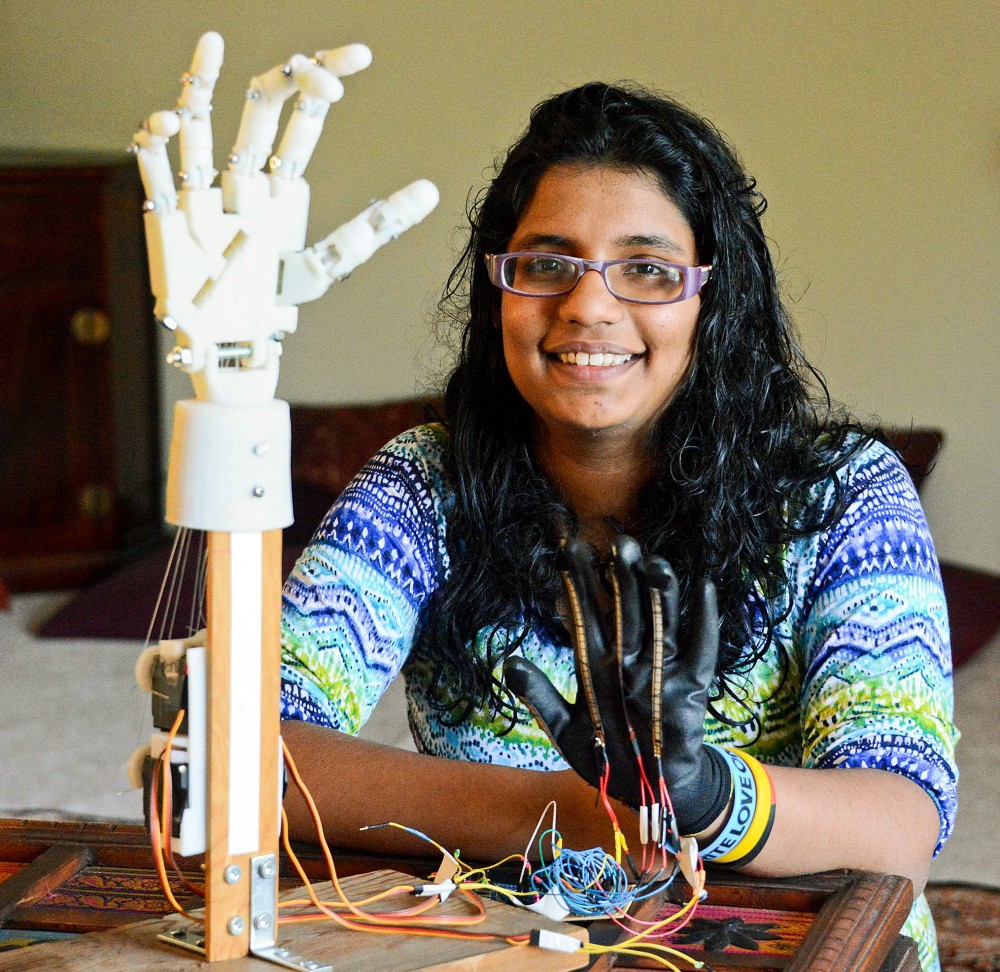By Natasha Lindstrom
The Pittsburgh Tribune-Review.
Ananya Cleetus has never been short on good ideas, nor the tenacity it took to execute them.
At 14, she designed and computer-tested a lightweight prosthetic leg for low-income people in India with below-knee amputations.
At 17, she conceptualized and 3-D printed a battery-operated prosthetic hand for patients suffering from leprosy.
Now a senior at Upper St. Clair High School, Cleetus, 18, is the CEO of a new social media network she hopes will enable teens around the world to take on similarly groundbreaking projects without the formidable burden of going at it alone.
“There are enough dating sites, there’s LinkedIn for business and professionals, there are lots of sites for photos, but one thing I really noticed was there really wasn’t much a mentor network for a student audience,” said Cleetus, who spent the past six months building out the sleek website and managing an 18-member team of teens scattered throughout the nation.
“I really wanted to create a social network that would allow high school students to find mentors both in universities and businesses.”
Her work on Magikstra, the social network in beta testing at five universities outside Pittsburgh, earned her this year’s Start-Up Entrepreneur honor as part of the 19th annual Carnegie Science Awards. She’ll be among the youngest at a May 8 ceremony to accept one of the 17 science and technology honors.
“What’s interesting about Ananya is that she’s doing both hardware and software,” said Ruthe Farmer, chief strategy and growth officer for the Boulder, Colo.-based National Center for Women & Information Technology. “She’s just really, really driven and persistent.”
Born in New Delhi, Cleetus moved shortly after she was born to Hong Kong and spent time living in Louisville and St. Louis before her family settled in the Pittsburgh area around the time she entered middle school.
Unlike her parents, who worked in advertising and the arts, and her younger sister, an award-winning painter, Cleetus gravitated from an early age to science- and engineering-based pursuits.
“I was always sort of this self-driven little scientist, whether it was taking apart whatever I could get my hands on or trying to concoct something in the kitchen — much to my mother’s chagrin, usually,” she said.
As an elementary school student, Ananya took apart pens and gadgets and tested what happened when she started the blender without the lid on. She often drew inspiration from her two favorite childhood TV shows: “Mythbusters” and “Bill Nye the Science Guy.”
Ananya became enamored with robotics as she entered high school and joined Carnegie Mellon University’s Girls of Steel robotics team.
She was one of five female students who chose to take her high school’s computer science course, and one of two girls out of 30 students in her school’s introductory engineering class. She managed to start her independent experiments while juggling a rigorous academic schedule, volunteering more than 250 hours, playing the drums in the marching band and advancing to a black belt in martial arts.
“I have been very fortunate to work with Ananya since she was in seventh grade, and, over that time, I have come to know her as an engaged, creative renaissance woman who is as at home writing as she is in a laboratory,” said Patricia Palazzolo, gifted coordinator at Upper St. Clair High School.
“It has been very exciting to watch her grow because she is someone who is a star — not only academically, but as a caring human being.”
Ananya’s passion for helping others motivated her to set up that first visit to a low-income prosthetic clinic while visiting her grandparents in India a few summers ago. She recalled being touched deeply by one patient, whose leg had been crushed while working in manual labor and who needed the prosthetic limb to get back to work.
“It was just one prosthetic, but it made such a huge impact on his life,” she said.
She decided then, as a high school freshman, that she would put her knack for building things and problem-solving to use for a higher cause.
Through her research, she learned that more than 260,000 people contract leprosy worldwide, and that India accounts for about 54 percent of all new cases, according to the International Federation of Anti-Leprosy Association.
“There are tons of prosthetics out there for hands, for feet, for brains, for eyes, but a lot of those are meant for people who are in a first-world setting or who can afford a lot more,” she said. “I had a lot of really cool ideas, but I had to sort of tone them down, if you will, and find a compromise between functionality and cost.”














































































































































































































































































































































































